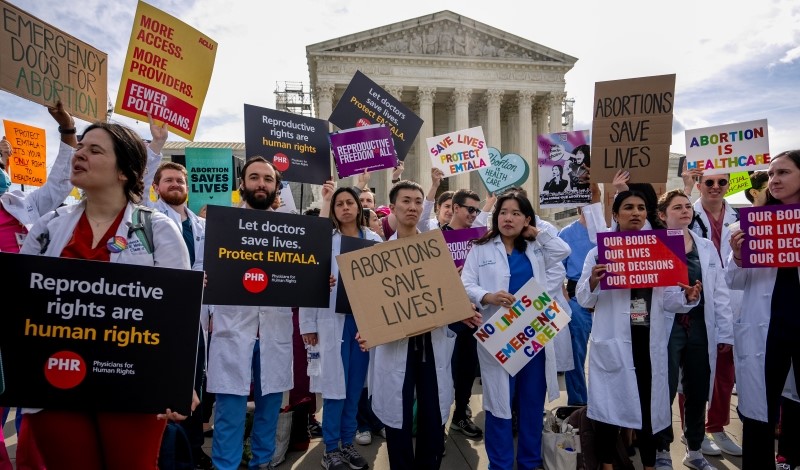
Scholars discuss EMTALA’s effects on physicians and argue for its continued use.
Does federal law require emergency medical providers to offer abortion care? Multiple lawsuits around the country— most notably Moyle v. United States—center this question. Moyle concerns whether an Idaho law banning nearly all abortions is preempted by the Emergency Medical Treatment and Labor Act (EMTALA), which requires hospitals to provide stabilizing emergency medical care to patients in need. The U.S. Supreme Court initially agreed to decide this case, but ultimately declined to resolve the conflict between these laws, dismissing the case as improvidently granted.
The U.S. Congress passed EMTALA in 1986 after physicians at Chicago’s Cook County Hospital exposed the pervasiveness of patient dumping—a practice in which hospitals refuse emergency services when patients cannot afford them. At the time, dumping doubled the risk of death and reduced the quality of medical care provided, especially for people of color and unemployed individuals. Increased awareness of patient dumping and its consequences, as well as increased federal government involvement in health care generally, led to the passage of EMTALA.
EMTALA authorizes the U.S. Department of Health and Human Services (HHS) to ensure that hospitals provide emergency medical care to all patients regardless of their ability to pay. The law requires hospitals to perform medical screening examinations on all patients. If the exam reveals an emergency medical condition, the provider must stabilize the condition or, if necessary, transfer the patient to a hospital that has the resources to do so. EMTALA also requires hospitals with greater resources or specialized care to accept transfers from other facilities. Failure to comply with the law exposes hospitals and physicians to significant fines.
Since the Supreme Court’s decision in Dobbs v. Jackson Women’s Health Organization gave states the authority to restrict abortion access, medical providers in states with abortion bans have faced uncertainty concerning when it is legal to provide stabilizing abortions. These providers risk criminal prosecution if a patient’s condition does not fall within their state’s narrow abortion restriction exceptions. But failing to stabilize a patient in crisis invites EMTALA sanctions. Consequently, obstetric care throughout restrictive states has decreased in availability and quality.
In 2022, HHS issued guidance that clarified EMTALA’s abortion mandates. The agency’s interpretation requires a hospital to provide an abortion if a pregnant patient has an emergency medical condition for which an abortion is the medical standard of stabilizing care. HHS argues that this interpretation means that states cannot enforce abortion bans with exceptions that are narrower than EMTALA’s emergency medical condition definition.
Scholars warn, however, that the future of EMTALA remains uncertain, at least until Moyle is resolved. The impact of the eventual decision could extend beyond emergency abortions. One scholar argues that if courts permit states to carve out exceptions to EMTALA’s application in obstetric emergencies, nothing would stop these states from further limiting required treatments for other stigmatized conditions or treatments, such as AIDS, mental illness, and gender-affirming care.
In this week’s Saturday Seminar, scholars discuss the effects of EMTALA on physicians and propose arguments to resolve current litigation.
- Doctors in states with abortion bans still must fulfill their legal obligations under EMTALA, Kimberly Chernoby of George Washington University School of Medicine and Health Sciences and Brian Acunto of AtlantiCare advise in an article in Western Journal of Emergency Medicine. EMTALA preempts conflicting state laws, requiring all physicians to provide stabilizing treatment—including emergency abortions—regardless of state restrictions, Chernoby and Acunto explain. Chernoby and Acunto provide examples of EMTALA violations in which patients were forced to travel to obtain emergency abortion care. The standard of care remains unchanging across state lines, Chernoby and Acunto conclude, and emergency physicians in states with abortion bans should meet with stakeholders to clarify their obligations under EMTALA and state law.
- Interviews with physicians from Idaho and surrounding states illustrate the need for EMTALA protections in states with abortion bans, argues Physicians for Human Rights (PHR) in a recent brief. PHR explains that the national standard of care for several emergency pregnancy complications is immediate delivery or abortion, which the Idaho ban prohibits in many cases. As a result, PHR notes, Idaho physicians report transporting patients to out-of-state hospitals or delaying care, and transported patients experience avoidable health complications that prompt treatment would prevent. PHR also found that insurance companies often refuse to cover costly transfers, thus placing financial burdens on patients. PHR advocates using EMTALA to prevent criminal prosecution of medically necessary abortions to stop these negative experiences.
- In an article published on the O’Neill Institute website, Sheela Ranganathan, Rebecca Reingold, and Emily Schneider of Georgetown Law’s O’Neill Institute for National & Global Health Law examine the Supreme Court justices’ lines of questioning in Moyle. In this case, Ranganathan, Reingold, and Schneider note, several justices—including Justice Sonia Sotomayor—discussed a significant difference between EMTALA and the Idaho abortion ban. Ranganathan, Reingold, and Schneider explain that Idaho’s law includes narrower exceptions than the exceptions under EMTALA and was challenged by the S. Department of Justice in 2022. A ruling in favor of Idaho would prevent hospitals in states with abortion restrictions from providing abortions that do not fit within a state law, Ranganathan, Reingold, and Schneider conclude.
- In an amicus curiae brief supporting the United States in Moyle, Nicole Huberfeld of Boston University School of Law and several coauthors argue that, based on traditional tools of interpretation, the Major Questions Doctrine (MQD) should not apply. Huberfeld and her coauthors explain that the MQD applies when agencies adopt unforeseen interpretations of statutes, but not when an agency acts in a way that Congress would have reasonably anticipated. The Huberfeld team argues that because EMTALA requires providers to offer any treatment that has a reasonable probability of stabilizing medical emergencies, the HHS guidance incorporating abortions as stabilizing treatments for medical emergencies falls within the ambit of Congress’s intentions and therefore does not trigger the MQD.
- The EMTALA controversy stems from the unworkability of the Supreme Court’s Dobbs decision, David S. Cohen of Drexel University Thomas R. Kline School of Law, Greer Donley of University of Pittsburgh School of Law, and Rachel Rebouché of Temple University Beasley School of Law argue in an amicus curiae brief supporting the United States in Moyle. Cohen, Donley, and Rebouché suggest that the guidance Dobbs provided for state abortion regulation is vague and confusing, and that the decision’s goals do not match its results. Cohen, Donley, and Rebouché explain that since Dobbs, maternity care has become scarcer—and disproportionately so in historically underserved communities. To avoid the confusion that led to Moyle, Cohen, Donley, and Rebouché advocate overturning Dobbs.
- In a comment in Dickinson Law Review, Natasha Rappazzo of Penn State Dickinson Law argues that vague language in state abortion bans is preempted by EMTALA. Rappazzo explains that federal law sets a baseline that states cannot legislate below, and that preemption displaces state laws that conflict with or provide fewer rights than federal laws. Rappazzo notes that EMTALA has a specific preemption provision that invalidates any state law that would prevent physicians from performing a procedure that would otherwise be allowed under EMTALA. Because EMTALA requires emergency medical conditions to be stabilized, and the method of stabilization depends on the emergency, EMTALA requires abortions in emergencies and preempts any state law that prohibits them, Rappazzo argues.
The Saturday Seminar is a weekly feature that aims to put into written form the kind of content that would be conveyed in a live seminar involving regulatory experts. Each week, The Regulatory Review publishes a brief overview of a selected regulatory topic and then distills recent research and scholarly writing on that topic.



